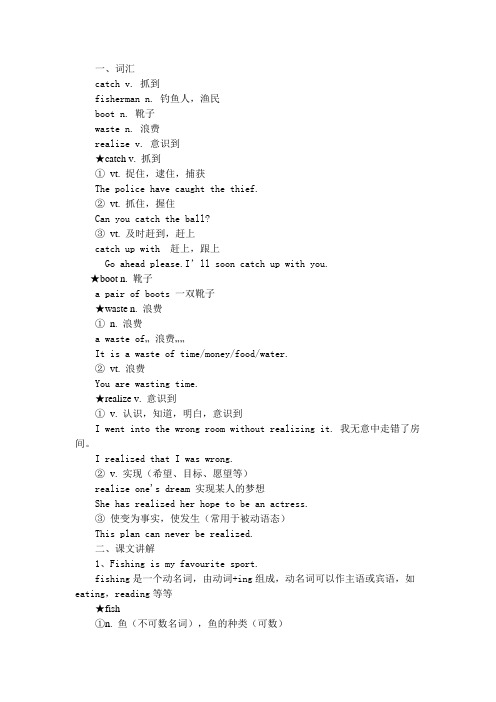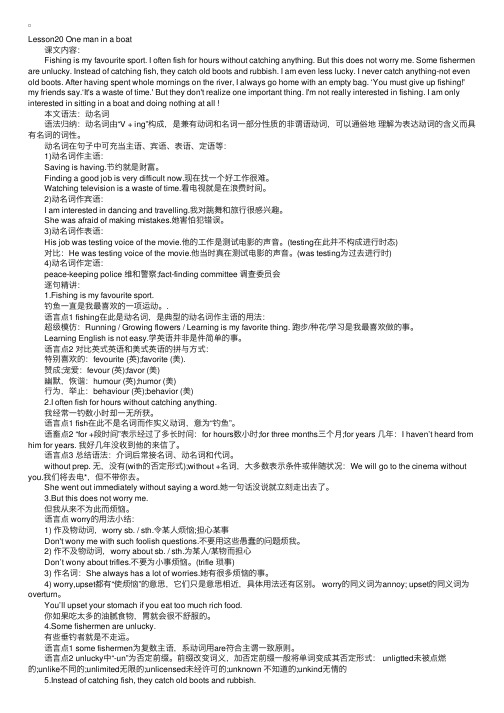新概念英语第二册:第20课课文详解及语法解析
新概念英语第二册第二十课课后习题答案详解 Lesson

新概念英语第二册第二十课课后习题答案详解Lesson 201. b根据课文第4行 I never catch anything---not even old boots, 只有 b. nevercatches anything 与课文实际内容相同,而其他3个选择都与课文内容不符。
根据课文最后一句I am only interested in sitting in a boat and doing nothingat all! 只有c. doing nothing 是正确答案,而其他3个选择都不符合课文内容。
本句是对主语提问的,回答是. who (谁)是对主语提问的;c. whom(谁)是对宾语提问的;d. whose(谁的)确是对定语提问的;只有b. which 是对做主语的事物提问的,所以选b.本句是带never的否定句,只有b. anything 可以用在否定句中。
而a. nothing若用在否定句中,就会使原句变成肯定意义的句子,不符合题目意思;c. something 只能用于肯定句中;d. everything 也不能用在否定句中。
前面句子 I am even less lucky 中的 less(不及)是表示否定意义的比较级,只有c. not so是表示否定意义的,而其他3个选择都没有否定的意思.只有b. an empty bag 最符合语法。
而其他3个选择都有语法错误。
a. a empty bag 中empty是以元音开头的,前面不能用a 而应该用an; c. empty bag 中 bag 是可数名词,需要用an 来修饰;d. oneempty bag 不符合习惯用法,单数可数名词前通常用不定冠词a 或an 修饰,除非表示强调才用one 修饰。
因此应该选b.只有c. all 才能使这个句子同前一句I am only interested in doingnothing.的含义相符合,all等于the things that ,可以代替doing nothing. 而其他3个选择中a. only 和d. the only 不符合语法,b. the one 不符合题目意思,不能完全表达清楚。
新概念第二册第二十课

★waste vt./n. 浪费
1) waste vt.浪费 You are wasting time. Don’t waste your time,money and energy. 2)waste n. 浪费 a waste of 对…的浪费 It is a waste of time/money/feeling/food. wastebasket 字纸篓 (美) wastepaper basket 字纸篓 (英)
New Concept English Ⅱ
Lesson 20 One man in a boat 独坐孤舟
When we are planing to go fishing,what should we take?
Here are some fishing gears .(鱼具)
fishing rod
I'm not really interested in fishing. I am only interested in sitting in a boat and doing nothing at all! sit in a boat 坐在船上 be in the same boat 同舟共济 burn one’s boat behind oneself 破釜沉舟 rock the boats (因意见不同) 搅局 捣乱
Instead of catching fish, they catch old boots and rubbiБайду номын сангаасh.
instead of 不做…而做… (可置于句首或句尾) instead of 后面的词一定是没有做的,可以放在主句后面 without强调没有做某件事,instead of强调这件事没做成而 做成了另外一件事 I go to school instead of staying at home. I bought books instead of buying dresses.
新概念第二册20课

Fisherman/’fiʃəmən/ n.
realize /’riəlaiz/
real adj.真的realize v. 意识到reality n. 现实 1.领悟,了解,认识到 realize one’s mistake She realized that he was lying. 2.实现,使成为事实 realize one’s dream/plan The girl finally realized her dream of becoming an actress.
awesome
If something is really good, you can say it’s awesome. Awesome means it’s great.
Jacky: Did you enjoy that book?
Ella:Yes, it’s awesome!
hang in there
Instead of.. 不做….而做…(可置于句首或句尾) +n./pron./v.ing I go to school instead of staying at home. without 强调没有做某事,instead of 强调这件事没 做成而做成了另一件事
Boot /bu:t/ n.
waste/weist/
1.waste vt. 浪费 Don’t waste your time. 2. waste n. 浪费 a waste of 对…的浪费 It is a waste of time/money/food.
近义词辨析
waste 普通用词,概念广泛,指任何被丢弃的
东西。 garbage 主要指有机废料,包括厨房的剩菜剩 饭或不能再用的食物。也可作引申用。 rubbish 普通用词,指任何成堆的、破损的、 用过的或无用的东西,尤指弃掉的垃圾堆。也 可作引申用。 litter 是四下乱丢物品的总称,尤指散落于地, 有碍观瞻的废物
(完整版)新概念英语第二册第20课课文讲解

一、词汇catch v. 抓到fisherman n. 钓鱼人,渔民boot n. 靴子waste n. 浪费realize v. 意识到★catch v. 抓到①vt. 捉住,逮住,捕获The police have caught the thief.②vt. 抓住,握住Can you catch the ball?③vt. 及时赶到,赶上catch up with 赶上,跟上Go ahead please.I’ll soon catch up with you.★boot n. 靴子a pair of boots 一双靴子★waste n. 浪费①n. 浪费a waste of… 浪费……It is a waste of time/money/food/water.②vt. 浪费You are wasting time.★realize v. 意识到①v. 认识,知道,明白,意识到I went into the wrong room without realizing it. 我无意中走错了房间。
I realized that I was wrong.②v. 实现(希望、目标、愿望等)realize one's dream 实现某人的梦想She has realized her hope to be an actress.③使变为事实,使发生(常用于被动语态)This plan can never be realized.二、课文讲解1、Fishing is my favourite sport.fishing是一个动名词,由动词+ing组成,动名词可以作主语或宾语,如eating,reading等等★fish①n. 鱼(不可数名词),鱼的种类(可数)There are a lot of fishes(表示种类)in the sea.②v. 钓鱼, 捕鱼2、I often fish for hours without catching anything.for+时间表示一段时间for hours=for some hours 数小时without catching anything作为状语而出现, 表示结果状语。
新概念第二册第20课完整ppt课件

【课文讲解】 Fishing is my favourite sport. 动词+ing(动名词):1.做主语;2.做宾语 favourite adj. 最喜欢的 无比较级,最高级 Red and Black is my favourite book. n. 心爱的人(物) ,最喜爱的东西 That song is one of his favourites. She is a favourite with her aunt. =She is her aunt’s favourite.
精选ppt
Instead of catching fish, they catch old boots and rubbish. instead of 不做…而做… (可置于句首或句尾) without强调没有做某件事,instead of强调这件事
没做成而做成了另外一件事 我原准备做……但是后来做了…… I go to school instead of staying at home. I bought books instead of buying dresses. instead of +n./ pron./v.-ing
用法:without前后必须保持一致。
Fish can not live without water. But this does not worry me. worry v. 使…担心
worry sb.使…担心 困扰某人 My little daughter worried me a lot. be worried about 对…感到担心 I was worried about my little daughter.
(本句主从句主语不一致,不可省略成 after doing 形式)
逐句精讲新概念英语第二册:第20课独坐孤舟

Lesson20 One man in a boat 课⽂内容: Fishing is my favourite sport. I often fish for hours without catching anything. But this does not worry me. Some fishermen are unlucky. Instead of catching fish, they catch old boots and rubbish. I am even less lucky. I never catch anything-not even old boots. After having spent whole mornings on the river, I always go home with an empty bag. ‘You must give up fishing!' my friends say.‘It's a waste of time.' But they don't realize one important thing. I'm not really interested in fishing. I am only interested in sitting in a boat and doing nothing at all ! 本⽂语法:动名词 语法归纳:动名词由“V + ing”构成,是兼有动词和名词⼀部分性质的⾮谓语动词,可以通俗地理解为表达动词的含义⽽具有名词的词性。
动名词在句⼦中可充当主语、宾语、表语、定语等: 1)动名词作主语: Saving is having.节约就是财富。
Finding a good job is very difficult now.现在找⼀个好⼯作很难。
Watching television is a waste of time.看电视就是在浪费时间。
新概念英语第二册Lesson20
Lesson 20 One man in a boat【New words and expressions】生词和短语★catch v. 抓到 catch fish, catch thief catch cold:染上感冒 catch a bus:赶车catch one's breath:摒住呼吸 catch sight of(see):看见catch fire:着火 catch one's eyes:吸引某人注意力★fisherman n. 钓鱼人,渔民★boot n.靴子 a pair of boots★waste n. v. 浪费 You are wasting time.a waste of: It is a waste of time.★realize v. 意识到 I realized that I was wrong.实现,realize one's dream【课文讲解】fish一般情况下作为不可数名词用There are a lot of fishes(表示种类)in the sea.fish(v.):钓鱼,捕鱼主语通常由名词和代词充当,以及动词+ingfor+时间……表示一段时间 for hours=for some hourswithout (prep.) 介词后面一定要加宾语动词+ing:1.做主语;2.做宾语anything用在否定句中without作为状语而出现,表示结果状语, without 后面的动作是主语来做.He went out without saying any words.Without asking for money, the boy went to school.(v.)worry sb. The house worried me. My daughter worried me.(adj.)be worried about 主语为宾语而感到担心I was never worried about this.instead of 后面的词一定是没有做的,可以放在主句后面without强调没有做某件事,instead of强调这件事没做成而做成了另外一件事我原准备做……但是后来做了……I go to school instead of staying at home. I bought books instead of buying dresses. less+原级 (不如) : A is less ... than Bspend+时间+在某地:在某地度过……时间after(conj.)+从句,从句主语必须是主句的主语才能换成下面一种形式after(prep.)+名词/动词的ing形式After I go to school, I learned a lot of knowledge.After going to school, I learned a lot of knowledge.with: 带着 without;没带give up doing/stop doing:放弃做某事在船上in the boatnot at all在否定句中起强调作用【Key structures】动词+ing(非谓语动词)可以做主语和宾语b.be keen on, be fond of, be interested in, enjoy+动词ingbe afraid of, be up to ,be capable of, without, instead ofc. I apologize.apologize for (not) doing sth., thank you for..., congratulate sb. on doing sth. Exercises C1.without without prep.+ doingHe went out of the restaurant without paying the bill.2.instead ofShe bought a pair of boots instead of getting a pair of shoes.=She bought a pair of boots instead of a pair of shoes.3.of : She was afraid of spending the night alone.4.afterafter+从句;after prep.+doing After hearing the news, she fainted.5.beforeThink carefully before answering my question. 在回答我的问题之前,请仔细考虑。
新概念第二册Lesson 20知识要点总结
新概念第二册Lesson 20复习要点一.L20词汇讲解:1.catch---caught---caughtcatch a fish 抓住一条鱼/catch a cold 得了感冒/catch the bus 赶公交车2.fisherman钓鱼人,渔民fireman消防员/newspaperman记者/milkman送奶工/postman邮递员/policeman警察/superman超人3.waste浪费a waster of time浪费时间/a waste of money 浪费钱/a waster of paper 浪费纸We shouldn’t waste water.我们不应该浪费水。
4.realize意识到realize the problem意识到这个问题realize that......realize a dream 实现梦想二.动名词:doing1.动名词作主语:Eating is always a pleasure.吃总是一件愉快的事情。
Fishing is my favourite sport.钓鱼是我最喜欢的运动。
2.介词后动词用ing形式:He sat there without saying anything. 他默默地坐在那儿。
She is afraid of staying in that house.她害怕待在那栋房子里。
三.重点短语:1.instead of 而不是She bought a pair of boots instead of getting a pair of shoes.她买了一双靴子,而不是一双鞋。
2.give up 放弃You must give up smoking.你必须放弃抽烟。
3.be interested in 对......感兴趣I’m not interested in fishing.我对钓鱼不感兴趣。
4.not at all 一点儿也不,一点也没有I don't want to speak at all.我一点儿也不想说话。
新概念英语第二册第二十课课后习题答案详解 Lesson 20教学内容
新概念英语第二册第二十课课后习题答案详解Lesson 201. b根据课文第4行 I never catch anything---not even old boots, 只有 b. nevercatches anything 与课文实际内容相同,而其他3个选择都与课文内容不符。
2.c根据课文最后一句I am only interested in sitting in a boat and doing nothingat all! 只有c. doing nothing 是正确答案,而其他3个选择都不符合课文内容。
3.b 本句是对主语提问的,回答是Fishing.a. who (谁)是对主语提问的;c. whom(谁)是对宾语提问的;d. whose(谁的)确是对定语提问的;只有b. which 是对做主语的事物提问的,所以选b.4.b本句是带never的否定句,只有b. anything 可以用在否定句中。
而a. nothing若用在否定句中,就会使原句变成肯定意义的句子,不符合题目意思;c. something 只能用于肯定句中;d. everything也不能用在否定句中。
5.c前面句子 I am even less lucky 中的 less(不及)是表示否定意义的比较级,只有c. not so是表示否定意义的,而其他3个选择都没有否定的意思.6.b只有b. an empty bag 最符合语法。
而其他3个选择都有语法错误。
a. a empty bag 中empty是以元音开头的,前面不能用a 而应该用an; c. empty bag 中 bag 是可数名词,需要用an 来修饰; d. oneempty bag 不符合习惯用法,单数可数名词前通常用不定冠词a 或an 修饰,除非表示强调才用one 修饰。
因此应该选b.7.c只有c. all 才能使这个句子同前一句I am only interested in doingnothing.的含义相符合,all等于the things that ,可以代替doing nothing. 而其他3个选择中a. only 和d. the only 不符合语法,b. the one 不符合题目意思,不能完全表达清楚。
新概念英语第二册:第20课课文详解及语法解析
新概念英语第二册:第20课课文详解及语法解析新概念英语第二册:第20课课文详解及语法解析课文详注Further notes on the text1.I often fish for hours without catching anything.我经常一钓数小时却一无所获。
without 通常表示“缺乏”、“没有”:I can't repair the car without your help.没有你的协助我无法修理这车。
当它位于动名词前时,它表示“不曾”、“不”:They tried to leave the restaurant without paying.他们企图不付账就离开餐馆。
John left the room without telling anyone.约翰离开房间时不曾告诉任何人。
2.Instead of catching fish, they catch old boots and rubbish.他们往往鱼钓不到,却钓上来些旧靴子和垃圾。
instead有“作为替代”、“反而”等含义,一般以短语形式instead of出现:Jack took part in the race instead of Tony.杰克代替托尼参加了比赛。
Instead of sugar, he bought some salt.他没有买糖,而是买了些盐。
副词instead单独使用时一般出现在句尾:If you don't want a holiday in England, why don't you go to Australiainstead?如果你不想在英国度假,那你为什么不去澳大利亚呢?3.I am even less lucky.我的运气甚至还不及他们。
less是little的比较级,意为“不及”、“不如”、“更少”:Tom has got little chocolate, and Jack has got even less.汤姆只有一点儿巧克力,杰克则更少。
- 1、下载文档前请自行甄别文档内容的完整性,平台不提供额外的编辑、内容补充、找答案等附加服务。
- 2、"仅部分预览"的文档,不可在线预览部分如存在完整性等问题,可反馈申请退款(可完整预览的文档不适用该条件!)。
- 3、如文档侵犯您的权益,请联系客服反馈,我们会尽快为您处理(人工客服工作时间:9:00-18:30)。
新概念英语第二册:第20课课文详解及语法解析课文详注 Further notes on the text
1.I often fish for hours without catching anything.
我经常一钓数小时却一无所获。
without 通常表示“缺乏”、“没有”:
I can't repair the car without your help.
没有你的协助我无法修理这车。
当它位于动名词前时,它表示“不曾”、“不”:
They tried to leave the restaurant without paying.
他们企图不付账就离开餐馆。
John left the room without telling anyone.
约翰离开房间时不曾告诉任何人。
2.Instead of catching fish, they catch old boots and rubbish.
他们往往鱼钓不到,却钓上来些旧靴子和垃圾。
instead有“作为替代”、“反而”等含义,一般以短语形式instead of出现:
Jack took part in the race instead of Tony.
杰克代替托尼参加了比赛。
Instead of sugar, he bought some salt.
他没有买糖,而是买了些盐。
副词instead单独使用时一般出现在句尾:
If you don't want a holiday in England, why don't you go to Australia
instead?
如果你不想在英国度假,那你为什么不去澳大利亚呢?
3.I am even less lucky.
我的运气甚至还不及他们。
less是little的比较级,意为“不及”、“不如”、“更少”:
Tom has got little chocolate, and Jack has got even less.
汤姆只有一点儿巧克力,杰克则更少。
I spend less time on English than on French.
我花在英语上的时间比花在法语上的少。
(cf. 第8课语法)
4.…I always go home with an empty bag.
……然后空着袋子回家。
with能够表示“有……的”、“持有……的”、“随身带着……”等:
Who's the man with the umbrella?
那个带伞的男人是谁?
Who's the man with the beard?
那个留胡子的男人是谁?
Who's the woman with the little boy?
带着那个小男孩的女人是谁?
5.I'm not really interested in fishing.
我并不是真的对钓鱼有兴趣。
表示“对……感兴趣”一般用be interested in sth. /doing sth.:
Tim is only interested in food.
蒂姆只对食物感兴趣。
I'm interested in collecting stamps.
我对集邮有兴趣。
语法 Grammar in use
动名词(The Gerund)(1)
动名词和现在分词的形式完全一样,都是由动词+-ing构成。
-ing 形式作名词时称为动名词。
从广义上讲,动名词能够代替名词,即使它像动词一样可带宾语。
像名词一样,它能够作主语:
Dancing is fun. I love it.
跳舞有意思,我喜欢跳舞。
Walking quickly is difficult.
走快是很难的。
(动名词+副词作主语)
Washing the car makes him dirty.
擦洗汽车把他身上弄脏了。
(动名词+宾语作主语)
动名词也能够作宾语或介词宾语:
Mary is keen on cooking.
玛丽热衷于烹调。
(介词宾语)
Congratulations on passing your exams!
祝贺你通过考试!
能够带动名词的介词通常有 before, after, instead of, without 等。
用介词+动名词结构能够将两个短句合为一句话,或者将一个从句变为动名词结构。
动名词的否定式是在它前面直接加not:
Tom always knocks before entering a room.
汤姆在走进一个房间前总要敲门。
He apologized for not writing to you.
他为没给你写信而表示道歉。
动名词也能够用表示完成时的 having +过去分词结构:
You can't leave the restaurant without having paid the bill.
在没有付账之前你不能离开饭店。
